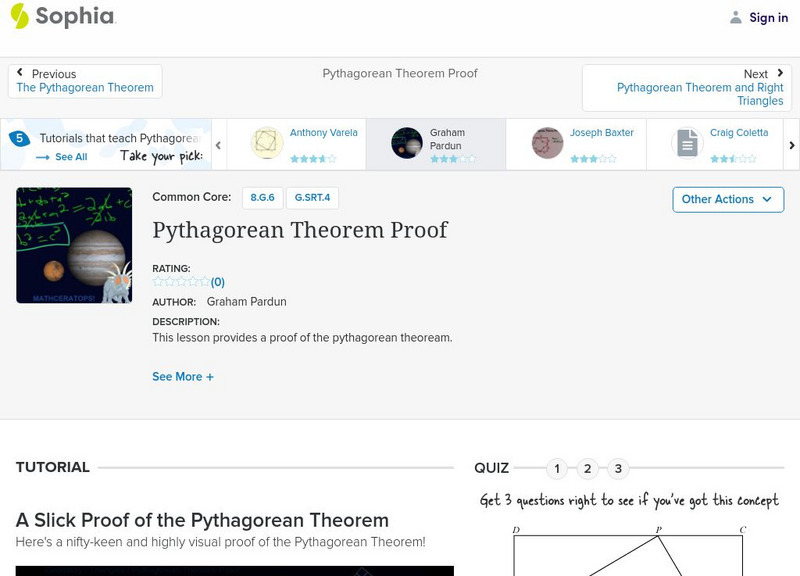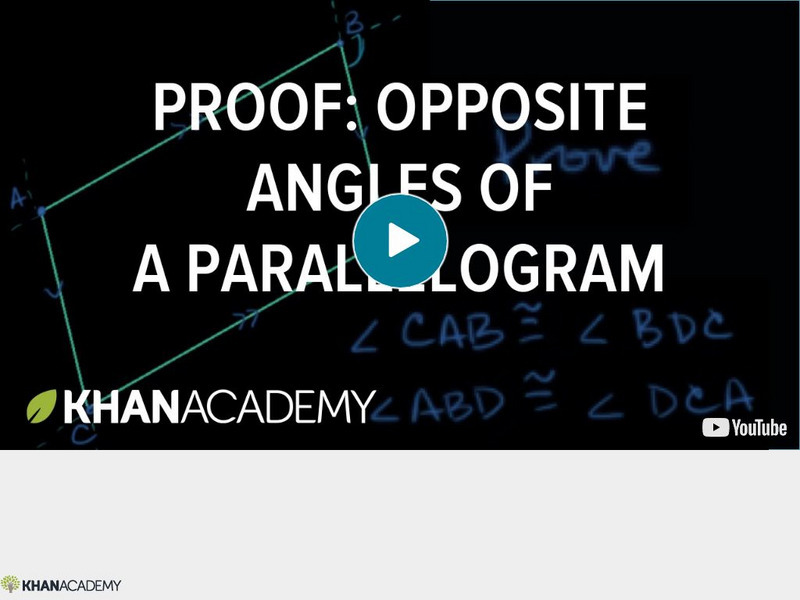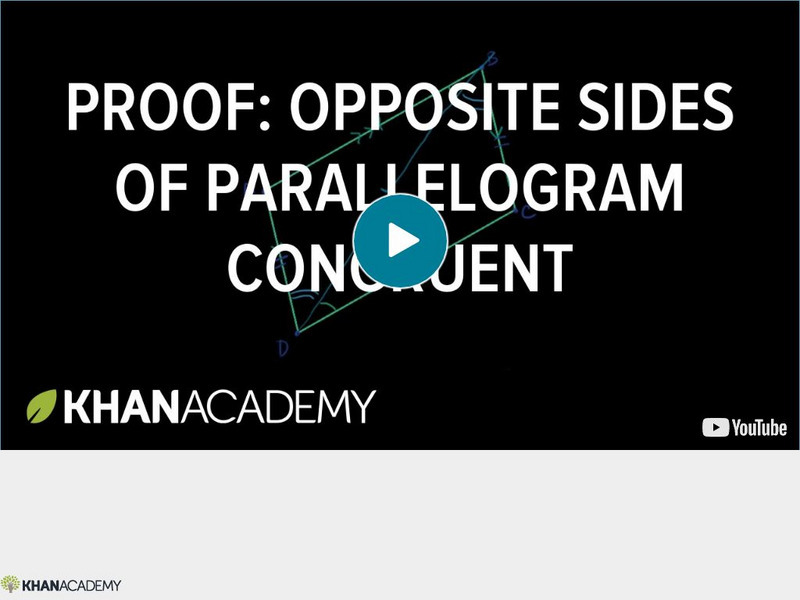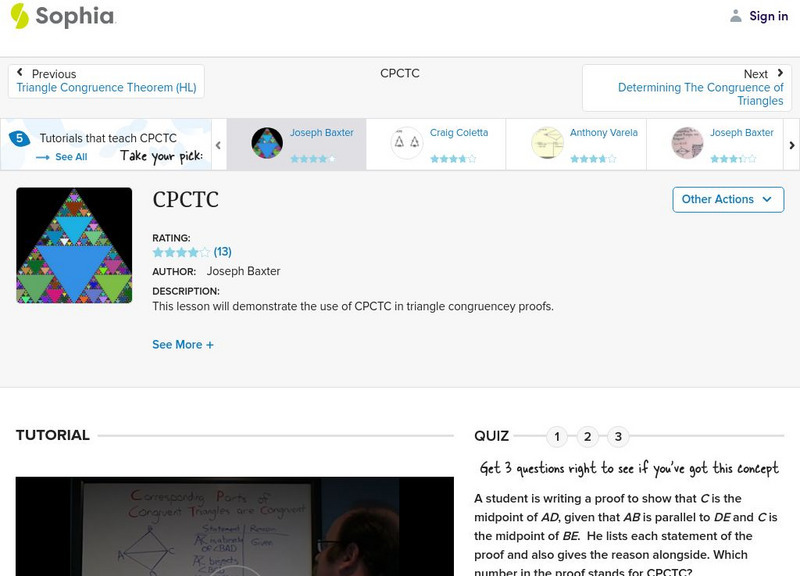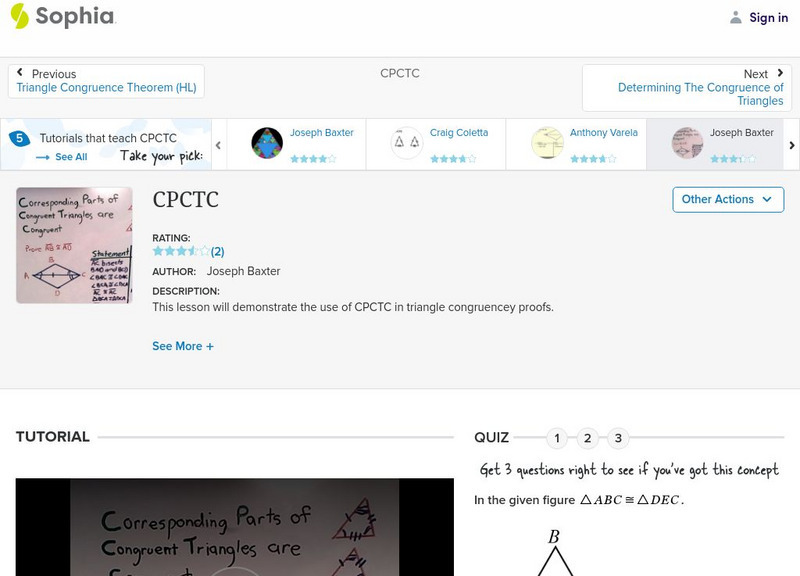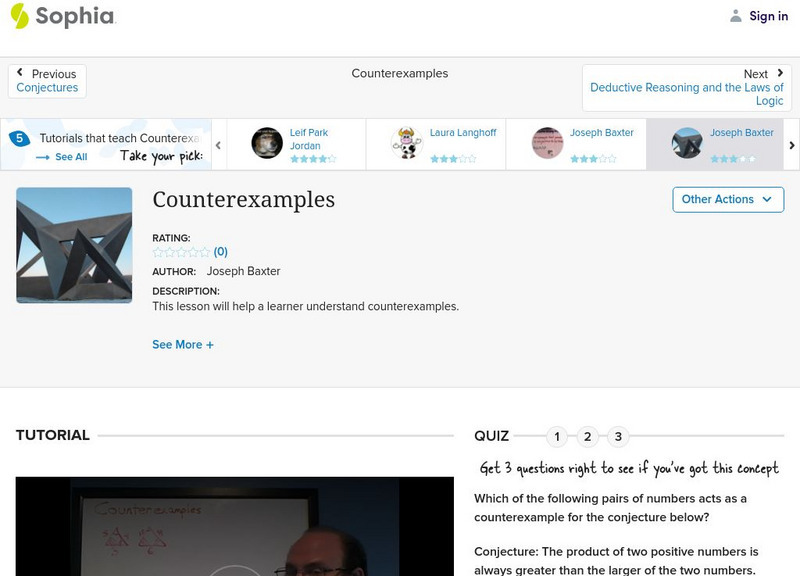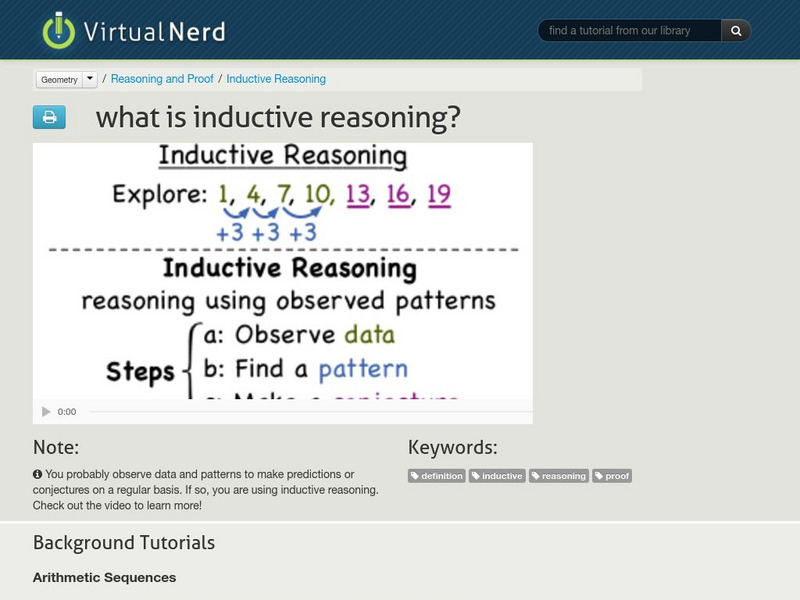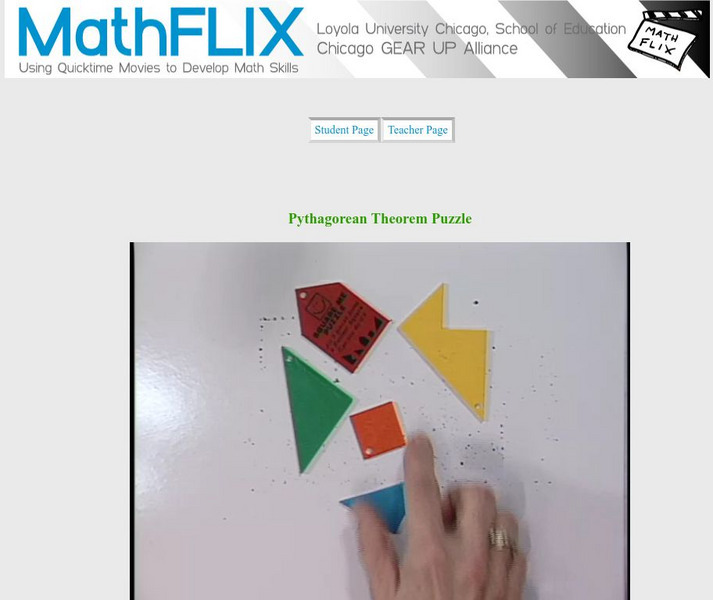Hi, what do you want to do?
Loyola University Chicago
Math Flix: Similar Figures: Proof Using Proportions
This QuickTime movie provides an opportunity to develop the basic geometric term, similar, by checking to see if figures are proportionaly similar. As you watch and listen to the teacher and student interact it helps clarify the thinking...
Sophia Learning
Sophia: Pythagorean Theorem Proof
Find the area of several figures to prove the Pythagorean theorem. Complete quiz to check understanding. [5:16]
Study Pug
Study Pug: Perpendicular Line Proofs
Video lesson explains angles, lines, and transversals. [9:33]
Sophia Learning
Sophia: Pythagorean Theorem Proof
Prove the Pythagorean theorem and take a quiz to assess learning.
Khan Academy
Khan Academy: Geometry: Part 1 of Proof of Heron's Formula
Demonstrates how to derive a version of Heron's formula using the Pythagorean Theorem and the formula for the area of a triangle. Applies Heron's formula to solve a sample problem. [10:59]
Khan Academy
Khan Academy: Geometry: Proof: Opposite Angles of Parallelogram Congruent
This video tutorial demonstrates how to prove that the opposite angles of a parallelogram are congruent based on knowledge of the special angles created when parallel lines are cut by a transversal. [4:08]
Khan Academy
Khan Academy: Geometry: Proof: Diagonals of Parallelogram Bisect Each Other
Demonstrates how to prove that the diagonals of a parallelogram bisect each other based on knowledge of the special angles created when parallel lines are cut by a transversal and the triangle congruency postulates. [9:06]
Khan Academy
Khan Academy: Geometry: Proof: Opposite Sides of Parallelogram Congruent
Demonstrates how to prove that the opposite sides of a parallelogram are congruent based on knowledge of the special angles created when parallel lines are cut by a transversal and the triangle congruency postulates. [8:30]
Khan Academy
Khan Academy: Geometry: Angles of Parallel Lines 2
Explains how to determine the measures of all the angles formed when parallel lines are cut by a transversal based on the measure of one angle. Explains how to use corresponding congruent angles to determine if lines cut by a transversal...
Khan Academy
Khan Academy: Proof: All Circles Are Similar
Demonstrates how to use a unit circle on a coordinate grid to prove that all circles are similar. [1:34]
Sophia Learning
Sophia: Cpctc: Lesson 1
This lesson [8:19] will demonstrate the use of CPCTC in triangle congruency proofs. It is 1 of 4 in the series titled "CPCTC."
Sophia Learning
Sophia: Cpctc: Lesson 4
This video lesson [6:45] will demonstrate the use of CPCTC in triangle congruencey proofs. It is 4 of 4 in the series titled "CPCTC."
Sophia Learning
Sophia: Cpctc (Corresponding Parts of Congruent Triangles)
Complete a multiple step proof to determine if two triangles are congruent. Take quiz to check for understanding.
Sophia Learning
Sophia: Counterexamples: Lesson 4
This lesson will help a learner understand counterexamples. It is 4 of 7 in the series titled "Counterexamples." [3:05]
Khan Academy
Khan Academy: Perpendicular Radius Bisects Chord
Proof that if a radius is perpendicular to a chord then it bisects the chord. This video also appears in the Geometry: Circles strand. [6:57]
Khan Academy
Khan Academy: Linear Algebra: Vector Triangle Inequality
Video first reviews the Cauchy-Schwarz inequality. Then shows a proof of the triangle inequality for vectors and relates it to the triangle inequality from 2-dimensional geometry. [18:53]
Virtual Nerd
Virtual Nerd: What Is a Theorem?
A theorem is a general mathematical statement that can be used to help solve all sorts of problems. Watch this tutorial for an introduction to theorems. [4:11]
Virtual Nerd
Virtual Nerd: What Is Inductive Reasoning?
Inductive reasoning is observing data and patterns to make predictions. Watch this tutorial to learn about inductive reasoning. [3:48]
Khan Academy
Khan Academy: Linear Algebra: Vector Triangle Inequality
Video first reviews the Cauchy-Schwarz Inequality the shows a proof of the Vector Triangle Inequality and relates it to the Triangle Inequality from 2-dimensional Geometry. [18:53]
Khan Academy
Khan Academy: Vector Dot and Cross Products: Vector Triangle Inequality
Thi videoreviews the Cauchy-Schwarz inequality and then shows a proof of the triangle inequality for vectors and relates it to the triangle inequality from 2-dimensional geometry.
Loyola University Chicago
Math Flix: Pythagorean Theorem Puzzle
This QuickTime movie uses a tangram-like puzzle to help understand the Pythagorean Theorem. As you watch and listen to the teacher and student interact it helps clarify the thinking behind applying this concept.
Sophia Learning
Sophia: Counterexamples: Lesson 6
This lesson will help a learner understand counterexamples. It is 6 of 7 in the series titled "Counterexamples." [1:54]
Virtual Nerd
Virtual Nerd: What Is a Biconditional Statement?
When a conditional statement and its converse are both true, you can write them as one statement called a biconditional statement. This tutorial illustrates this special kind of statement. [6:27]
Other popular searches
- Geometry Proofs
- Geometry Proofs Worksheets
- Coordinate Geometry Proofs
- Basic Geometry Proofs
- Lesson on Geometry Proofs
- Geometry Proofs Polygon
- Geometry Proofs and Axioms
- Geometry Proofs Squares
- Geometry Proofs Angles
- Geometry Circle Proofs
- Geometry Proofs + Square
- Euclidean Geometry Proofs








